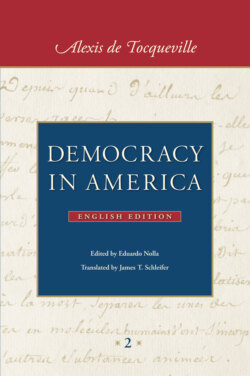Читать книгу Democracy in America - Alexis de Tocqueville - Страница 8
На сайте Литреса книга снята с продажи.
Оглавление[print edition page xxvi]
Key Terms
Certain key terms used by Tocqueville present particular translation difficulties. Some, for example, have no precise English equivalent (e.g., lumières); others are extremely abstract or have a variety of meanings, depending on context. As translator, my goal was to choose the best alternative and then to be consistent throughout the edition. The following terms should be noted:
état social—translated closely as social state, instead of social condition.
idée mère—translated as either generative or main idea. The same principle is used for pensée mère, passion mère, etc. But science mère is rendered as mother science.
inquiétude—usually translated as restlessness (and inquiet as restless), but sometimes it can be concern or worry. Earlier French dictionaries show that traditionally the word meant primarily an inability to be at rest, or restlessness; the more modern sense of worry or concern was not as important. A closely related word, agitation, is almost always rendered as the cognate, agitation, except occasionally when it is translated as constant motion or constant movement.
intérêt bien entendu—translated as interest well understood or well understood interest, rather than interest properly understood, self-interest properly/well understood, or enlightened self-interest, all of which are unnecessary glosses on the meaning.
liberté d’écrire—In English, for freedom of written expression, there is no equivalent such as freedom of speech for freedom of spoken expression; freedom of the press is a more specific term. So for liberté d’écrire, I have simply used freedom to write. Related terms to note include liberté de penser, freedom of thought, and liberté d’esprit, freedom of mind (in the sense of intellectual freedom).
[print edition page xxvii]
lumières—usually translated as enlightenment, occasionally as knowledge or learning.
mœurs—translated as mores, not an ideal word, but the best available option in English.
pouvoir d’un seul—translated as power of one man or, occasionally, power of one man alone, rather than power of a single man, which is ambiguous.
In addition, the following less crucial, but still important words should be noted:
affaires—almost always translated as public affairs, unless clearly otherwise (such as matters).
empire—translated as dominion, or a few times, as sway or rule.
État—translated as State (upper case) when referring to the nation, the general political body; otherwise, state (lower case) when referring to one of the American states.
fonctionnaire—translated as officer when related to the American town (town officer); otherwise, official.
intelligences—No good English equivalent exists; usually translated as minds; sometimes the phrase is altered to use the adjective intellectual.
la justice—In certain chapters of Tocqueville’s book the word means justice, but usually it means the judicial system or court system.
législateur—translated as law-maker when Tocqueville is talking about the maker of fundamental law, the constitution-maker; otherwise, legislator.
patrie—translated as native land or country, rather than fatherland or homeland.
sauvage—either savage or wild, depending on the context.
solitudes—closely related to désert(s) (see Translator’s Note, p. xxii); usually translated as uninhabited (or empty) places (or areas), sometimes as wilderness, and once or twice as solitude or seclusion.
